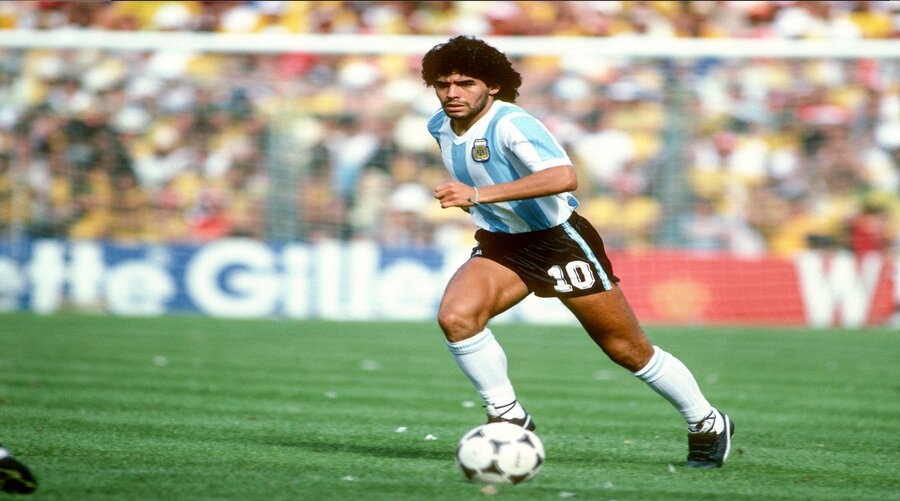Diego Maradona, also known as “El Pibe de Oro” (The Golden Boy), is widely regarded as one of the greatest football players of all time. Born on October 30, 1960, in Lanús, Buenos Aires, Argentina, Maradona rose from humble beginnings to become a global icon and a national hero. His incredible skill, tenacity, and charisma captured the hearts of millions around the world, and his impact on the game of football is still felt today.
Early Life and Career Diego Maradona
Maradona grew up in a poor neighborhood on the outskirts of Buenos Aires. He began playing football at a young age and quickly demonstrated his talent on the pitch. By the age of 10, he was already playing for local youth teams, and at 15, he was signed by Argentinos Juniors, a professional club in Buenos Aires.
Maradona made his professional debut in 1976 and quickly established himself as a star player. He helped lead Argentinos Juniors to the national championship in 1980, and his performances caught the attention of larger clubs in Argentina and Europe.
International Success
Maradona’s international career began in 1977, when he was selected to play for Argentina’s national youth team. He quickly rose through the ranks and made his debut for the senior team in 1979. Maradona’s first major international tournament was the 1982 World Cup in Spain. Although Argentina were eliminated in the second round, Maradona’s performances were impressive, and he was named the tournament’s best young player.
Four years later, Maradona led Argentina to victory in the 1986 World Cup in Mexico. He scored five goals in the tournament, including two of the most famous goals in football history. In the quarterfinals against England, Maradona scored the infamous “Hand of God” goal, in which he punched the ball into the net with his left hand. Just minutes later, he scored what is widely considered the greatest goal in World Cup history, dribbling past five England players before slotting the ball past the goalkeeper.
Maradona’s performances in the 1986 World Cup cemented his status as one of the greatest football players of all time. He was named the tournament’s best player and became a national hero in Argentina.
Club Success
Maradona’s club career was equally impressive. After leaving Argentinos Juniors in 1981, he signed with Boca Juniors, one of the most popular clubs in Argentina. Maradona’s time at Boca was brief but highly successful. He helped lead the club to the league title in 1981, and his performances caught the attention of Europe’s top clubs.
In 1982, Maradona signed with Barcelona, one of the biggest clubs in the world. He had a successful first season, but his time at the club was marred by injuries and conflicts with the management. In 1984, Maradona signed with Napoli, a relatively small club in southern Italy. He quickly became a fan favorite and helped lead the club to its first-ever Serie A title in 1987. Maradona’s time at Napoli was the most successful period of his club career. He won two Serie A titles, the UEFA Cup, and the Italian Cup, and he was named the Serie A Footballer of the Year twice.
Personal Life and Struggles
Despite his incredible success on the pitch, Maradona’s personal life was often turbulent. He struggled with drug and alcohol addiction throughout his career, and he was often in the news for his off-field antics. In 1991, he was suspended from football for 15 months after failing testing positive for cocaine. He returned to the game in 1992 but struggled to recapture his previous form.
In addition to his struggles with addiction, Maradona also faced health issues throughout his life. He battled obesity and other health problems, and in 2000, he was hospitalized with heart problems. In 2004, he underwent gastric bypass surgery to address his weight issues.
Legacy and Impact
Despite his personal struggles, Maradona’s impact on the game of football is undeniable. He inspired a generation of players with his incredible skill and passion for the game. His performances in the 1986 World Cup are still talked about today, and his goals are still watched and admired by fans around the world.
Maradona’s legacy extends beyond the football pitch. He was a cultural icon in Argentina and around the world, and his impact on popular culture is still felt today. He was a symbol of hope and resilience for many, and his story inspired countless people to pursue their dreams and overcome adversity.
Tragically, Maradona passed away on November 25, 2020, at the age of 60. His death was mourned by millions around the world, and he was remembered as one of the greatest football players of all time.
Conclusion
Diego Maradona was a true legend of the game, whose impact on football and popular culture will never be forgotten. His incredible skill, passion, and charisma captivated the world, and his story inspired countless people around the world. Although his personal struggles were well documented, Maradona’s legacy is one of hope, resilience, and the power of sport to transcend boundaries and bring people together.
READ MORE
- FOOTBALL: RULES AND REGULATION’S
- Pinworms: Causes, Symptoms, Treatment and Prevention
- Chandra Shekhar Azad: The Iconic Revolutionary
- ज़िंदगी आइस पाइस- निखिल सचान
- Radio Day: Celebrating the Legacy of Radio Broadcasting
- International Women’s Day
- International Mother’s Day

